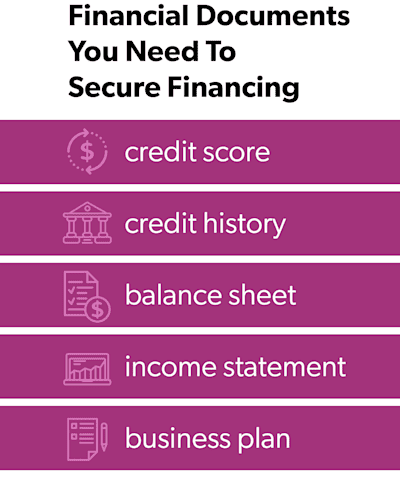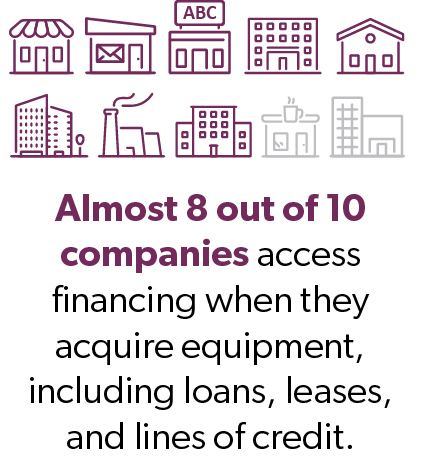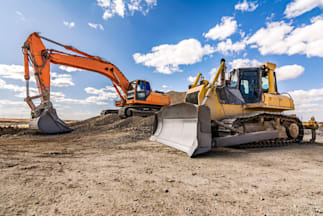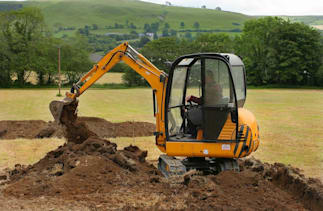Many leaders of successful businesses start small, growing their businesses organically through sales. However, when you reach the point where you need more equipment to scale the business, revenue might not be sufficient yet to buy it with cash.
This article outlines how to prepare your financials before discussing your needs with equipment financing experts. When you come prepared with these documents for your equipment finance meeting, you save time and make a great impression, which, in some cases, can lead to more favorable equipment financing terms. Let’s get ready to impress.
Gather, Organize, And Update Your Financial Statements
As a business leader, when you apply for equipment financing, lenders want to see specific financial data to help them understand the financial health and story of your business… and where it’s headed.
Among the updated, current financial statements lenders will also review include your credit score, credit history, and cash flow statement.

- Credit Score - Your credit score and history show lenders your past history of using credit and repaying it. Lenders gather and review credit score during the underwriting process, so don’t worry about providing it yourself.
- Balance Sheet - The balance sheet gives lenders a better idea of your business’s assets and liabilities.
- Income Statement - Your income statement shows profits and losses.
- Cash Flow Statement - A cash flow statement indicates how cash moves through your business.
- Business Plan - If you’re a newer business – three years or less – providing a business plan helps a lender better understand where your business is today and how you intend to build and grow your business.
Before we get into the details, it’s important to mention that First Business Bank often requires only an application for equipment requests of less than $250,000. Typically, the more financing you request, the more information we need from you. Also, if you’ve been in business fewer than three years, we often ask for more financial information to gauge the health of your business.
Use the details below to help you collect and prepare the financial statements you need to secure equipment financing.
Know Your Credit Score and Credit History
Although lenders will obtain and review your credit score during the underwriting process, if you want to take a look at it yourself, here are a few options to get it:
- Your credit report. Once a year, you can request a free credit report from the large credit bureaus. It’s a best practice to do this at least once a year to make sure there are no errors that might drag down your score.
- Credit card statement or loan balance. Some credit card companies and lenders publish your credit score on your monthly statement or in your online profile.
- Credit counselors. Counselors who work for nonprofit credit counseling organizations can access your credit score for you, as well.
What To Include On Your Balance Sheet
A balance sheet shows your company’s assets, liabilities, and equity, or net worth.

- Assets: Assets are items your company owns, such as cash in the bank, money owed to you by clients (receivables), your inventory, and property, including your existing equipment. Knowing the value of your assets as collateral and how liquid they are can help you secure equipment financing.
- Liabilities: Liabilities include what you owe to other people and entities, like bank loans, accounts payable, wages payable, and other debt.
- Equity: Equity is the value of the owners’ stake in the company, and you can calculate it simply by subtracting the value of the liabilities from the assets. Positive equity points to a financially healthy company.
Examine Your Income Statement
These statements show whether your company is making a profit or incurring a loss by examining your revenue, expenses, and net income. Equipment financing companies typically like to see steady or increasing profits over time.
Additional Supporting Documents
Depending on your industry and your business’s history, an equipment finance expert might require some or many of these financial documents to support your equipment financing needs.
- Tax Returns: If a traditional balance sheet and income statement aren’t available, we like to see two or three years of your business tax returns for a clear view of your financial history and stability.
- Bank Statements: Your bank statements hopefully show us your business cash flow cycle.
- Debt Schedule: Current loans, leases, and other obligations are listed in your debt schedule and shows how much your business is already repaying.
- Equipment Quotes: Quotes for the equipment you want to lease or buy helps us determine what’s reasonable. If you are looking to finance a used piece of equipment, a condition report (mileage, etc.) can be very helpful.
- Financial Projections: If you are a newer business (three years or fewer), financial projections, which may be included in your business plan, can be very helpful to a lender to understand your growth plans. Your financial projections show how new, or additional equipment, will help grow your revenue and earnings.
Create An Equipment Finance Budget
Before seeking equipment financing, creating a budget will help smooth the conversation with your equipment financing expert. Make sure your budget is reasonable and in line with industry standards. Also, remember to include costs for delivery, installation, training, and maintenance in your budget.
Preparation Helps Companies Secure Equipment Loans
Benjamin Franklin famously said some version of, “If you fail to prepare, you’re preparing to fail.” By taking time to gather these documents before meeting with an equipment finance company, you’ll cut your time with them in half along with making a positive impression as a knowledgeable business leader, which helps your case, too.





